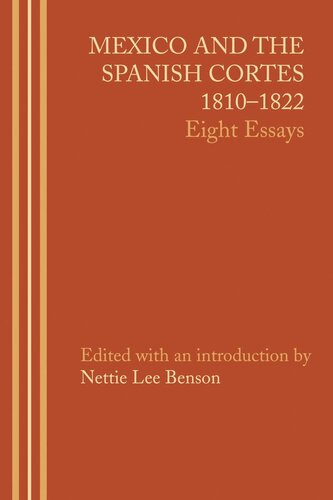

Most ebook files are in PDF format, so you can easily read them using various software such as Foxit Reader or directly on the Google Chrome browser.
Some ebook files are released by publishers in other formats such as .awz, .mobi, .epub, .fb2, etc. You may need to install specific software to read these formats on mobile/PC, such as Calibre.
Please read the tutorial at this link: https://ebookbell.com/faq
We offer FREE conversion to the popular formats you request; however, this may take some time. Therefore, right after payment, please email us, and we will try to provide the service as quickly as possible.
For some exceptional file formats or broken links (if any), please refrain from opening any disputes. Instead, email us first, and we will try to assist within a maximum of 6 hours.
EbookBell Team

4.7
26 reviewsFew developments in the history of the Spanish colonial system in Mexico have been more carelessly treated or more often misinterpreted than the attempt to establish constitutional government in New Spain under the Spanish monarchy during the 1809–1814 and 1820–1822 periods. Yet the broad outlines of the Mexican constitutional system were laid then, largely through the insistent efforts of the Mexican deputies to the Cortes, the Spanish legislative body. Some of the delegates also grasped this opportunity to inform their countrymen and train them in the effectiveness of parliamentary debate and resolution as a more intelligent road to democratic and representative government. The 70 Mexican deputies (of the 160 elected) who actively participated in the sessions of the Cortes either helped draw up the Constitution of 1812, which initiated provisions for many needed reforms relating to military, religious, economic, educational, judicial, and governmental affairs in Mexico, or contributed to the enabling acts consequent to these provisions. The prime reason for calling the Cortes, however, and especially for inviting the participation of the Mexicans, was to attempt to maintain New Spain’s loyalty to the mother country, an unrealized objective in the long run, although much constructive discussion of this goal was offered by the Mexican delegates. These eight essays trace the establishment and implementation of the Mexican electoral system, both national and municipal, and of reforms in the economic, journalistic, religious, and military systems. They serve as an informative introduction to the revolutionary role the Cortes of Spain played in Mexican history and as a record of the contribution of Mexican delegates to the beginning of liberal reform in their country.